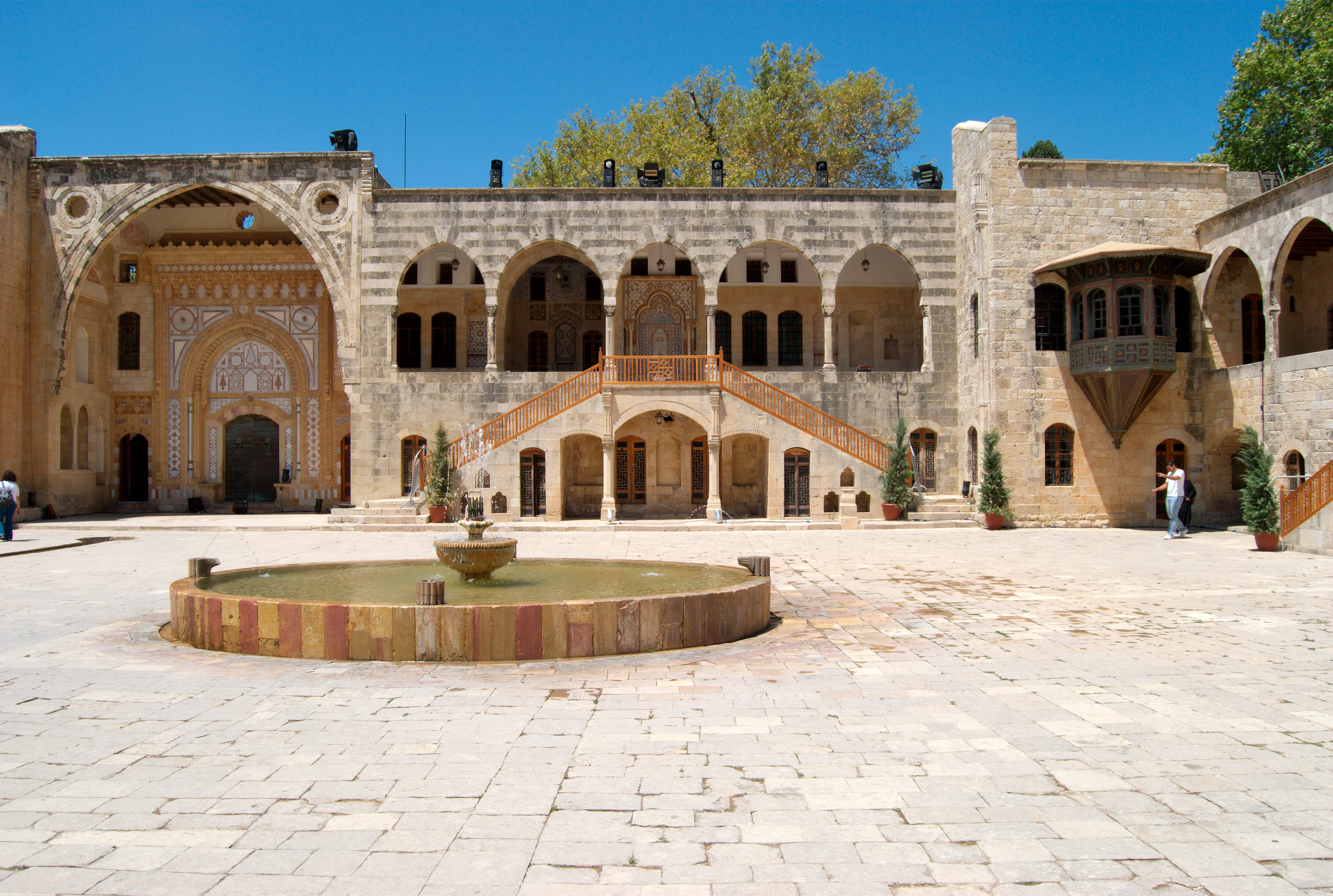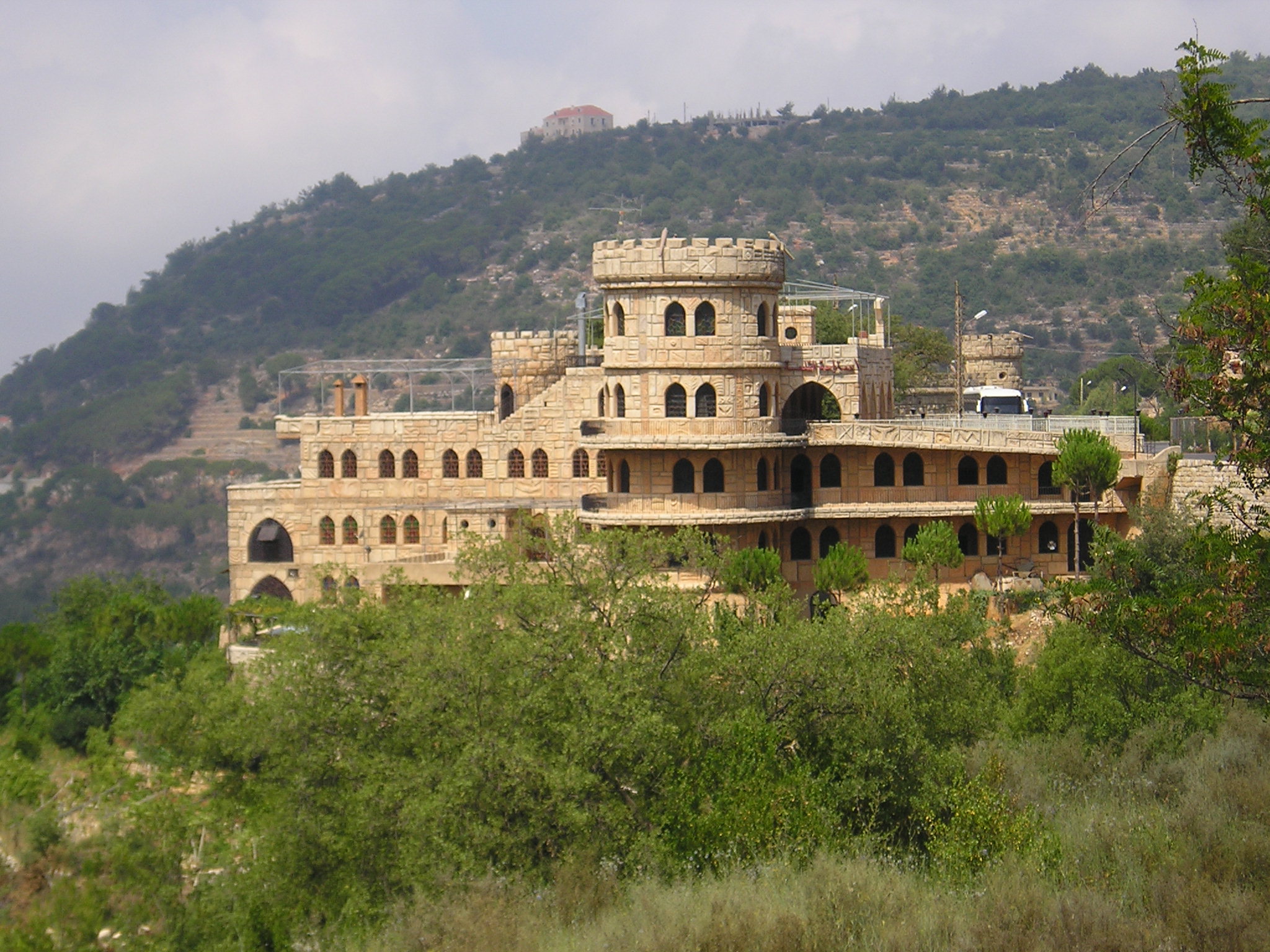|
Beit Ed-Dine
Beit ed-Dine ( ar, بيت الدين), also known as Btaddine ( ar, بتدين) is a small town and the administrative capital of the Chouf District in the Mount Lebanon Governorate in Lebanon. The town is located 45 kilometers southeast of Beirut, and near the town of Deir el-Qamar from which it is separated by a steep valley. It had 1,613 registered voters in 2010 and its inhabitants are predominantly Christians from the Maronite, Melkite and Greek Orthodox denominations. Beit ed-Dine's total land area consists of 244 hectares and its average elevation is 860 meters above sea level. The town is well known for the Beiteddine Palace, which hosts the annual summer Beiteddine Festival. History Ottoman era Emir Bashir II of the Shihab dynasty, who later became the ruler of the Mount Lebanon Emirate, started building the palace in 1788 at the site of the Druze hermitage (hence the palace's name, translating as "''House of Faith''"), indicating that the town was initially p ... [...More Info...] [...Related Items...] OR: [Wikipedia] [Google] [Baidu] |
List Of Sovereign States
The following is a list providing an overview of sovereign states around the world with information on their status and recognition of their sovereignty. The 206 listed states can be divided into three categories based on membership within the United Nations System: 193 member states of the United Nations, UN member states, 2 United Nations General Assembly observers#Present non-member observers, UN General Assembly non-member observer states, and 11 other states. The ''sovereignty dispute'' column indicates states having undisputed sovereignty (188 states, of which there are 187 UN member states and 1 UN General Assembly non-member observer state), states having disputed sovereignty (16 states, of which there are 6 UN member states, 1 UN General Assembly non-member observer state, and 9 de facto states), and states having a political status of the Cook Islands and Niue, special political status (2 states, both in associated state, free association with New Zealand). Compi ... [...More Info...] [...Related Items...] OR: [Wikipedia] [Google] [Baidu] |
Beiteddine Festival
The Beiteddine Festival ( ar, مهرجان بيت الدين) is an annual summer festival that takes place in Beiteddine Palace in Beiteddine, Lebanon. It was launched amidst war and destruction in the middle of the 80's. It came as an act of faith in Lebanon's cultural specificity and its power of creativity and artistic freedom. It was a call for normality in the middle of the chaos and madness of the civil war. It was established in 1984 with local artistic performances and it gradually started having regional and international performances. Over the years, it has included concerts or performances related to classical music, dance, theatre, opera, jazz, and modern world music. The Palace The festival takes place in the large 200-year-old Beiteddine Palace in the Chouf Mountains, in Lebanon. Festival Highlights *Roberto Alagna *Kadim Al Sahir *Charles Aznavour *George Benson *Caracalla Dance Theatre *Mariah Carey *José Carreras *Phil Collins *Plácido Domingo *Montserrat C ... [...More Info...] [...Related Items...] OR: [Wikipedia] [Google] [Baidu] |
Chouf Mountains
Chouf (also spelled Shouf, Shuf or Chuf, in ''Jabal ash-Shouf''; french: La Montagne du Chouf) is a historic region of Lebanon, as well as an administrative district in the governorate (muhafazat) of Mount Lebanon. Geography Located south-east of Beirut, the region comprises a narrow coastal strip notable for the Christian town of Damour, and the valleys and mountains of the western slopes of Jabal Barouk, the name of the local Mount Lebanon massif, on which the largest forest of Cedars of Lebanon is found. The mountains are high enough to receive snow. History The Emirs of Lebanon used to have their residence in Chouf, most notably Druze Emir Fakhr al-Din II, who attained considerable power and acted with significant autonomy from the Ottoman Empire in the 17th century. He is often referred to as the founder of modern Lebanon, although his area of influence and later control included parts of current Israel and Syria. Other emirs include the more controversial Bachir Chehab ... [...More Info...] [...Related Items...] OR: [Wikipedia] [Google] [Baidu] |
From Liberty To Violence In The Late Ottoman Empire
From may refer to: * From, a preposition * From (SQL), computing language keyword * From: (email message header), field showing the sender of an email * FromSoftware, a Japanese video game company * Full range of motion, the travel in a range of motion * Isak From (born 1967), Swedish politician * Martin Severin From (1825–1895), Danish chess master * Sigfred From Sigfred From (12 December 1925 – April 1998), was a Danish chess player. Biography From the begin of 1960s to the begin of 1970s Sigfred From was one of Danish leading chess players. He regularly played in Danish Chess Championships. Her bes ... (1925–1998), Danish chess master * ''From'' (TV series), a sci-fi-horror series that debuted on Epix in 2022 {{disambig ... [...More Info...] [...Related Items...] OR: [Wikipedia] [Google] [Baidu] |
Abdul Hamid II
Abdülhamid or Abdul Hamid II ( ota, عبد الحميد ثانی, Abd ül-Hamid-i Sani; tr, II. Abdülhamid; 21 September 1842 10 February 1918) was the sultan of the Ottoman Empire from 31 August 1876 to 27 April 1909, and the last sultan to exert effective control over the fracturing state. The time period which he reigned in the Ottoman Empire is known as the Hamidian Era. He oversaw a period of decline, with rebellions (particularly in the Balkans), and he presided over an unsuccessful war with the Russian Empire (1877–1878) followed by a successful war against the Kingdom of Greece in 1897, though Ottoman gains were tempered by subsequent Western European intervention. In accordance with an agreement made with the Republican Young Ottomans, he promulgated the Ottoman Empire's first Constitution, which was a sign of progressive thinking that marked his early rule. However, in 1878, citing disagreements with the Ottoman Parliament, he suspended both the short-lived con ... [...More Info...] [...Related Items...] OR: [Wikipedia] [Google] [Baidu] |
1860 Mount Lebanon Civil War
The 1860 civil conflict in Mount Lebanon and Damascus (also called the 1860 Syrian Civil War) was a civil conflict in Mount Lebanon during Ottoman rule in 1860–1861 fought mainly between the local Druze and Christians. Following decisive Druze victories and massacres against the Christians, the conflict spilled over into other parts of Ottoman Syria, particularly Damascus, where thousands of Christian residents were killed by Muslim and Druze militiamen as ethnic cleansing. The fighting precipitated a French-led international military intervention. Background The relationship between the Druze and Christians has been characterized by harmony and coexistence, with amicable relations between the two groups prevailing throughout history. After the Shehab dynasty converted to Christianity, the Druze lost most of their political and feudal powers. Also, the Druze formed an alliance with Britain and allowed Protestant Christian missionaries to enter Mount Lebanon, creating t ... [...More Info...] [...Related Items...] OR: [Wikipedia] [Google] [Baidu] |
French Mandate Of Lebanon
The State of Greater Lebanon ( ar, دولة لبنان الكبير, Dawlat Lubnān al-Kabīr; french: État du Grand Liban), informally known as French Lebanon, was a state declared on 1 September 1920, which became the Lebanese Republic ( ar, الجمهورية اللبنانية '; french: République libanaise) in May 1926, and is the predecessor of modern Lebanon. The state was declared on 1 September 1920, following Decree 318 of 31 August 1920, as a League of Nations Mandate under the proposed terms of the Mandate for Syria and the Lebanon which was to be ratified in 1923. When the Ottoman Empire was formally split up by the Treaty of Sèvres in 1920, it was decided that four of its territories in the Middle East should be League of Nations mandates temporarily governed by the United Kingdom and France on behalf of the League. The British were given Palestine and Iraq, while the French were given a mandate over Syria and Lebanon. General Gouraud proclaimed the establi ... [...More Info...] [...Related Items...] OR: [Wikipedia] [Google] [Baidu] |
Ottoman Empire
The Ottoman Empire, * ; is an archaic version. The definite article forms and were synonymous * and el, Оθωμανική Αυτοκρατορία, Othōmanikē Avtokratoria, label=none * info page on book at Martin Luther University) // CITED: p. 36 (PDF p. 38/338) also known as the Turkish Empire, was an empire that controlled much of Southeast Europe, Western Asia, and North Africa, Northern Africa between the 14th and early 20th centuries. It was founded at the end of the 13th century in northwestern Anatolia in the town of Söğüt (modern-day Bilecik Province) by the Turkoman (ethnonym), Turkoman tribal leader Osman I. After 1354, the Ottomans crossed into Europe and, with the Ottoman wars in Europe, conquest of the Balkans, the Ottoman Anatolian beyliks, beylik was transformed into a transcontinental empire. The Ottomans ended the Byzantine Empire with the Fall of Constantinople, conquest of Constantinople in 1453 by Mehmed the Conqueror. Under the reign of Sule ... [...More Info...] [...Related Items...] OR: [Wikipedia] [Google] [Baidu] |
Exile
Exile is primarily penal expulsion from one's native country, and secondarily expatriation or prolonged absence from one's homeland under either the compulsion of circumstance or the rigors of some high purpose. Usually persons and peoples suffer exile, but sometimes social entities like institutions (e.g. the papacy or a government) are forced from their homeland. In Roman law, ''exsilium'' denoted both voluntary exile and banishment as a capital punishment alternative to death. Deportation was forced exile, and entailed the lifelong loss of citizenship and property. Relegation was a milder form of deportation, which preserved the subject's citizenship and property. The term diaspora describes group exile, both voluntary and forced. "Government in exile" describes a government of a country that has relocated and argues its legitimacy from outside that country. Voluntary exile is often depicted as a form of protest by the person who claims it, to avoid persecution and prose ... [...More Info...] [...Related Items...] OR: [Wikipedia] [Google] [Baidu] |
Deir Al-Qamar
Deir al-Qamar ( ar, دَيْر الْقَمَر, lit=Monastery of the moon, translit=Dayr al-qamar), is a city south-east of Beirut in south-central Lebanon. It is located five kilometres outside of Beiteddine in the Chouf District of the Mount Lebanon Governorate at 800 m of average altitude. History Crusader period The oldest written reference to Deir el Qamar (''Deir elcamar'' or ''Deir elchamar'') goes back to 1257 and 1261 in the deeds of ''Julian of Shouf'' and ''Andrew of Shouf'' selling their lands and villages in their lordship of Shouf to the Theutonic Order as reported in ''Tabulae Ordinis Theutonici''. Ottoman period During the 16th to 18th centuries, Deir al-Qamar was the capital and the residence of the Emirate of Mount Lebanon. It is also notable for its 15th-century Fakhreddine Mosque, Fakhreddine II Palace, and the palace of the Emir Yusuf Shihab - today housing the Municipal Council. A 17th-century synagogue is still standing in the village, although cl ... [...More Info...] [...Related Items...] OR: [Wikipedia] [Google] [Baidu] |
Druze In Lebanon
Lebanese Druze ( ar, دروز لبنان, durūz lubnān) are Lebanese people who are Druze. The Druze faith is a monotheistic and Abrahamic religion, and an ethnoreligious esoteric group originating from the Near East who self identify as unitarians ( ar, موحدين, muwaḥḥidīn). The Lebanese Druze people are believed to constitute about 5.2 percentLebanon 2015 International Religious Freedom Report U.S. Department of State. Retrieved on 2019-04-23. of the total population of Lebanon and have around 1.5 million members worldwide. The Druze, who refer to themselves as al-Muwahhideen, or "believers in one God," are concentrated in the rural, mountainous areas east and south of |








